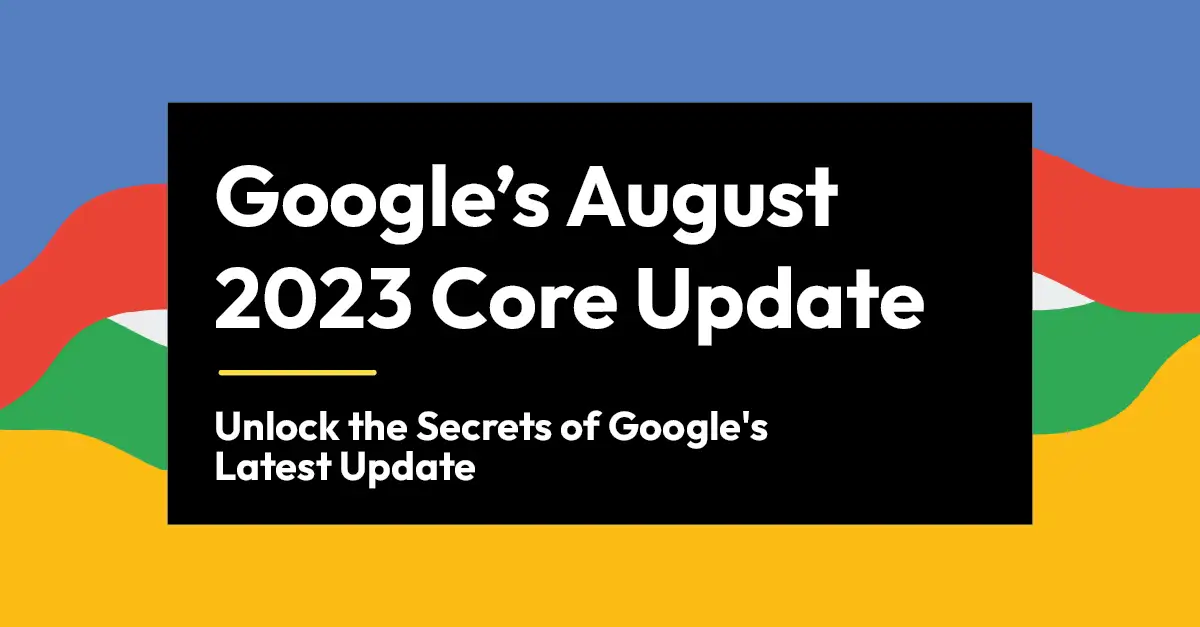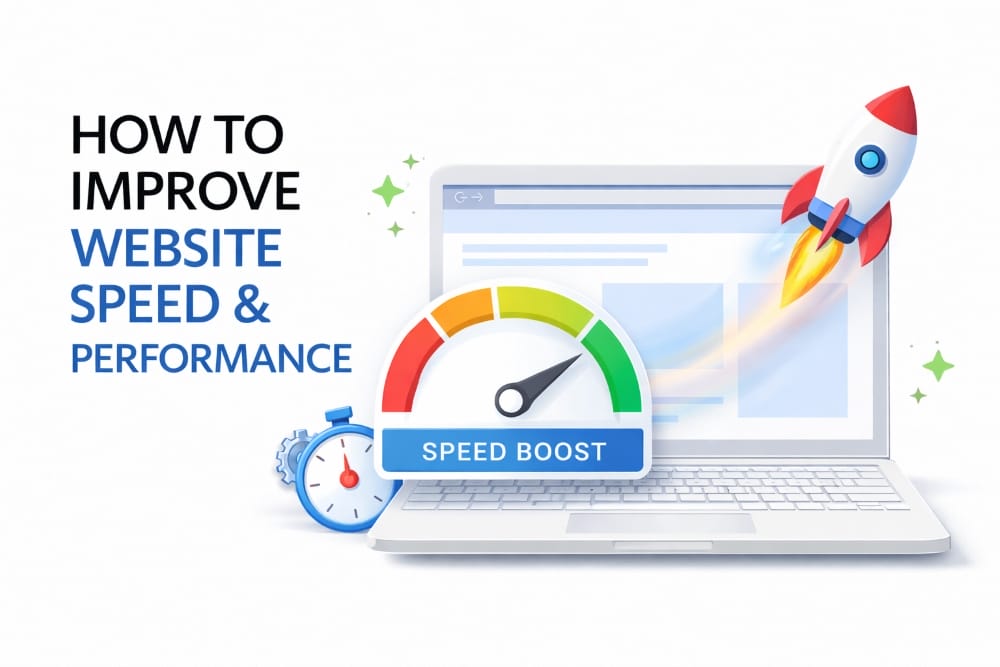August 2023 Google Core Update – What Changed?

Google’s Core Updates have become a defining moment for businesses, digital marketers and SEO professionals worldwide. The latest update is no exception, bringing with it a fresh set of challenges and opportunities that will shape the online landscape.
In this post, we’ll explore the implications for your business, and the strategies you can employ to stay ahead of the curve. Whether you’re a seasoned expert or a newcomer to the field, this guide is designed to equip you with the insights needed to navigate the ever-evolving world of search engine optimization. Let’s delve into the intricacies of this significant update.
It’s been a while…
At 6.30am BST, 22nd August, 2023, Google began the rollout of their second core algorithm update this year, labelled the “August Core Update“. On their official search status dashboard, Google announced that the August 2023 Core Update is going to take approximately 2 weeks until it’s fully rolled out.
Today we released the August 2023 core update. We’ll update our ranking release history page when the rollout is complete: https://t.co/sQ5COfdNcb
— Google Search Central (@googlesearchc) August 22, 2023
Historically we have seen an average of two to three core algorithm updates each year – with a larger volume of more targeted updates spread between, such as the helpful content update rolled out last august, or the April 2023 reviews update for example. This means that there’s a high probability that this could be the last core algorithm update of the year, with a possibility of one more to come. In 2022, we saw around 10 documented Google updates, with a further 10 in 2021, which has left marketers wondering why this year has had so few major updates when compared to previous years (4 so far).
Before we get stuck into the deep-end, let’s first explore what a core Google update really is…
Here’s what we know
Google’s core algorithm updates are often released with scarce documentation about what specifically has changed or been updated, which leads digital marketers to speculate on what this means for them and how they should react accordingly.
While little detail has been provided so far about the specifics of the August 2023 rollout, we know from previous experience that core algorithm updates typically have the following effects:
- Increase in SERP Volatility.
- Improved Search Quality.
- Websites with good, helpful content are typically rewarded.
- Search Marketers and Webmasters will typically panic, and overreact to any update – causing more harm to their own business than is necessary. Don’t let this be you!
These broad Core Updates historically were focused on specific verticals within the online realm. Most notably, the last Core Update rolled out in March 2023, affected various verticals online such as Government & Law, Vehicles and Health. In contrast to this, the Core Update rolled in September 2022 affected only a single vertical: Arts & Entertainment.
“One way to think of how a core update operates is to imagine you made a list of the top 100 movies in 2021. A few years later in 2024, you refresh the list. It’s going to naturally change. Some new and wonderful movies that never existed before will now be candidates for inclusion. You might also reassess some films and realise they deserved a higher place on the list than they had before.” – Google
What on Earth is SERP Volatility?
SERP (Search Engine Results Page) Volatility refers to the changes within the results you receive when typing a query into a search engine.
When volatility is high, you can expect to see dramatically different results to those you’re used to for all sorts of queries. Most commonly, this is caused by a new set of rules or weighted measures being applied to Google’s ranking algorithm but rarely, these can also occur from unnatural user behaviour (such as trends exploding overnight).
Semrush’s SERP Volatility Sensor started reporting increased ongoing volatility from the 18th of August, peaking at ~9.3/10. This volatility is considerably higher than the previous update’s 8.4/10, suggesting that the changes deployed within this update are much more significant.
How will this affect me?
While Google’s lack of documentation of these updates makes preemptively preparing for them rather difficult, there are steps we can take to infer the potential areas affected by each update by broadening our view and having a look at the wider landscape of Digital Marketing.
The recent release of AI Assisted tools for content writing resulted in a large volume of poorly written, unhelpful content being released online. Naturally, this compromises the quality approach Google has taken towards content recently and it’s safe to assume this update aims to address these issues caused by AI tools and content.
If you’ve been affected by a recent core update, you’ll probably notice that your competitors content may have been rewarded, and in turn, begin to outrank your content.
The give-aways will be if you see a significant decrease in traffic, or rankings. Remember, that search results are dynamic and therefore, a decrease in rankings may not mean that your pages are being punished, but rather that your competitors pages are being rewarded. The key principle to consider is that your focus should remain on the quality of your webpages, and the experience that you deliver to users, rather than worrying about the small details.
If you notice any of the following, it’s likely that your website is instead being affected for another reason, rather than the core update itself:
- Have your pages suddenly been deindexed? Perhaps they are considered to be low quality, copied, or violating Googles policy’s.
- Are your pages being crawled less frequently? Perhaps they are in need of an update to remain relevant in today’s search results
- Have you received a manual action? You have likely violated Google’s policies and should take immediate action to remedy this.
If you feel that you’ve experienced any of these recently, enquire about our professional SEO services. Book a free consultation with Lewis, our SEO Manager and start your recovery today! To understand how SEO services are priced you can read how much does SEO cost.
How to recover if you are negatively affected?
Google’s John Mueller put it best:
“It’s not so much that we would consider it a situation where you have to fix something. But rather, when it comes to relevance, if you work on improving the relevance of your website, then you have a different website, you have a better website.
So it’s not that we would switch back and say oh, it’s like the issue is fixed, and we will change it back to the previous state.
But rather, you’re saying well this is a better website now, and we look at it and say oh it’s a better website. It’s not the same or comparable to before, so it would be kind of tricky to expect that it changes to the state it was before. But it’s a new website, it’s a better website.
I think, especially with core updates, when you’re talking about recovery, it’s not so much you’re recovering but rather Google is seeing that you have a better website and reacting to that.” – @JohnMu
Hear @JohnMu @dannysullivan, and @g33konaut talk about the latest algorithm here…
Help! The search algorithm has been updated, and now I need to start over!
Tune into the latest #SOTRPodcast where @JohnMu, @dannysullivan, and @g33konaut, chat about everything you need to consider when the ranking algorithm changes → https://t.co/ECHKIY4aDT pic.twitter.com/xzVbY5p9UX
— Google Search Central (@googlesearchc) August 22, 2023
Thankfully, recovering from a core update is the one thing Google has provided plenty of documentation on. Presented as a set of questions, this helps site owners get to the bottom of what might be causing their site to be affected by the recent update. We’ve compiled some of the most important questions presented on the site for you:
- Is my content helpful?
- Is this the sort of page you’d want to bookmark, share with a friend, or recommend?
- If you researched the site producing the content, would you come away with an impression that it is well-trusted or widely-recognized as an authority on its topic?
- Would you feel comfortable trusting this content for issues relating to your money or your life?
Google even released some official content guidelines to help webmasters to ensure the content they create is considered “helpful”, “reliable” and “people-first” content. For more information about Google’s algorithms, check out how search works.
Need help with SEO? We’ve got you covered.
Recovering from a core update can seem like an extremely daunting challenge to overcome, especially if you’re facing it alone. Allow us to help!
As one of the UK’s leading Digital Marketing Agencies, we take pride in our ability to stay ahead of the curve with updates, trends and industry changes.
To see how you can upscale your business and improve your online presence, book a free consultation today! Head on over to our inquiry form and a senior member of our staff will be in touch!



